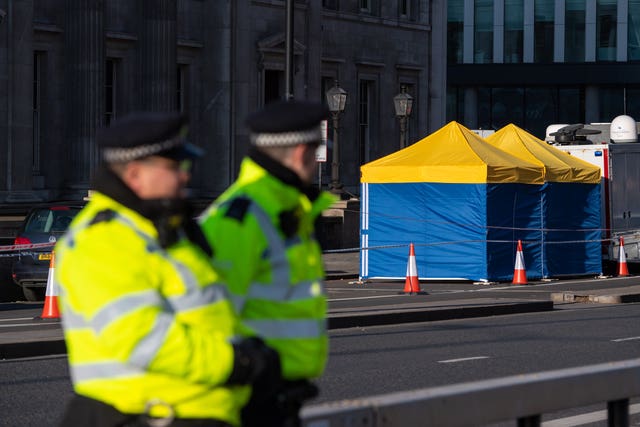
New laws to keep terrorists behind bars for longer and reform the monitoring of suspects have been backed by MPs.
The Counter-Terrorism and Sentencing Bill is viewed by the Government as the largest overhaul of sentencing and monitoring in decades.
It includes a minimum 14-year jail term for the most dangerous terrorist offenders, who will also have to spend up to 25 years on licence after their release.
Those handed extended determinate sentences will have to serve their whole term in jail and would be denied early release.
 Police tents outside Fishmonger’s Hall, on London Bridge, following the terrorist attack (Dominic Lipinski/PA)
Police tents outside Fishmonger’s Hall, on London Bridge, following the terrorist attack (Dominic Lipinski/PA)
Terrorists could also be made to take a lie detector test to prove they have reformed and are not planning another attack.
The Bill also lowers the standard of proof required to impose Terrorism Prevention and Investigation Measures (Tpims), despite Conservative-led administrations repeatedly increasing it in recent years.
The home secretary would need “reasonable grounds” for suspecting someone is, or has been, involved in terrorist activity to impose a Tpim rather than basing the decision on the “balance of probabilities”.
A Tpim notice can involve measures like an enforced curfew, tagging, living away from an address or area and restrictions on overseas travel, and are used by security services against people either involved in terrorism or present a threat but cannot be prosecuted or deported.
The Bill removes the two-year limit on Tpims, which campaigners have warned could result in courts renewing them indefinitely.
Terror attacks at Fishmongers’ Hall on November 29 2019 and in Streatham on February 2 2020 have hastened efforts for reform.
Speaking in the Commons, Justice Secretary Robert Buckland said: “We continue to face a terrorist threat in this country that is complex, that is diverse and that is rapidly changing.
“And the House has rightly noted the growing threat that we face from right wing extremists. Since 2017, we have foiled 25 terrorist plots including eight plots planned by right wing extremists.
“But we’re not complacent. We’ve already established a joint extremism unit to strengthen the partnership of work across the Ministry of Justice and the Home office and of course there is much, much more to do.”
Shadow justice secretary David Lammy said Labour supported the “important” Bill despite concerns, adding: “While it is only right that those who have committed the most heinous crimes are subjected to extended sentences, we cannot give up the hope of rehabilitation.”
Justice minister Chris Philp earlier confirmed the Government will publish its Multi Agency Public Protection Arrangements (Mappa) review before the Bill goes to the Lords, amid Labour calls for a review into strategies to deal with lone terrorists.
The Bill received an unopposed third reading and will undergo further scrutiny in the Lords at a later date.


Why are you making commenting on The Herald only available to subscribers?
It should have been a safe space for informed debate, somewhere for readers to discuss issues around the biggest stories of the day, but all too often the below the line comments on most websites have become bogged down by off-topic discussions and abuse.
heraldscotland.com is tackling this problem by allowing only subscribers to comment.
We are doing this to improve the experience for our loyal readers and we believe it will reduce the ability of trolls and troublemakers, who occasionally find their way onto our site, to abuse our journalists and readers. We also hope it will help the comments section fulfil its promise as a part of Scotland's conversation with itself.
We are lucky at The Herald. We are read by an informed, educated readership who can add their knowledge and insights to our stories.
That is invaluable.
We are making the subscriber-only change to support our valued readers, who tell us they don't want the site cluttered up with irrelevant comments, untruths and abuse.
In the past, the journalist’s job was to collect and distribute information to the audience. Technology means that readers can shape a discussion. We look forward to hearing from you on heraldscotland.com
Comments & Moderation
Readers’ comments: You are personally liable for the content of any comments you upload to this website, so please act responsibly. We do not pre-moderate or monitor readers’ comments appearing on our websites, but we do post-moderate in response to complaints we receive or otherwise when a potential problem comes to our attention. You can make a complaint by using the ‘report this post’ link . We may then apply our discretion under the user terms to amend or delete comments.
Post moderation is undertaken full-time 9am-6pm on weekdays, and on a part-time basis outwith those hours.
Read the rules hereLast Updated:
Report this comment Cancel